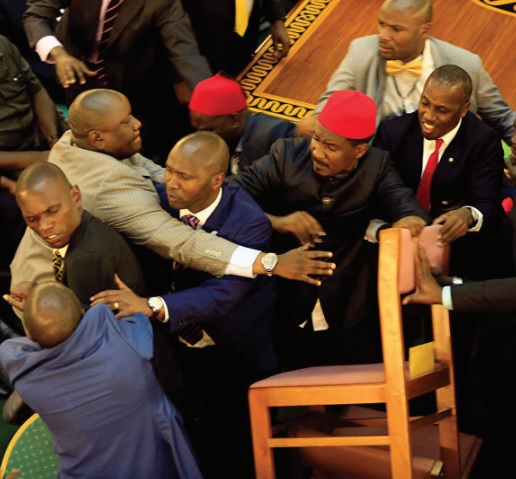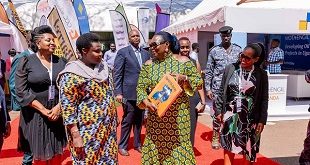
This gave the opposition and observers a hint and they started scrutinizing every move for potential early signs. That’s why some keen observers say Museveni started strategising to remove the age-limit as early as immediately after elections in February 2016.
Sources familiar with the planning told The Independent that Museveni invited top NRM party-leaning lawyers in the country to brainstorm on avenues the party could use to ensure key judges were on their side since most of his cadre judges were soon retiring. It is alleged that Museveni who felt he has full control of the Executive and the legislature, with most members being either NRM flag bearers or Independent leaning towards NRM, now he wanted to dominate the judiciary also. He was preparing for any legal battle ahead; including on lifting the age-limit.
NRM insiders say Museveni also assigned his confidants role to ensure the Bill goes through. One of them, Micheal Katungi, was mobilising colleagues for the amendment as early as July.
At the time, Museveni was still posturing and branding those involved in the campaign to remove the age-limit ‘redundant’. Then-Forum for Democratic Change (FDC) party president Gen. Mugisha Muntu warned people not to be fooled by the president’s comments.
He said in an interview with The Independent that Museveni was “a crafty operator who has mastered the art of playing on people’s intelligence”.
He cited a 1986 meeting of the army High Command, the top organ of the army that met to discuss how long they would stay in power before handing over to private authority.
Muntu says when a question came up about the period of time that the military establishment needed to re-organise the country before handing over to an elected civilian government, one of the attendees suggested four years. But, Muntu said, Museveni quickly interrupted him saying they only needed two years.
“But, silently, Museveni turned around and used other individuals to push his agenda and ended up staying in power for eight years without an election,” Muntu said.
So it came as no surprise that on July 24, Katungi had called a special meeting of Museveni’s trusted staffers and party loyalists like former ICT Minister Nyombi Thembo, President’s Private Assistant for Political Affairs David Mafabi and Kasanda legislator Simeo Nsubuga among others at a discreet ruling party facility in a Kampala suburb of Mbuya to draw plans of how they could easily have the amendment sail through.
Sensing the coming onslaught, the opposition Democratic Party (DP) had on July 20 launched the K’ogikwatako campaign and a road map on how the activists would traverse the country rallying the populace to show opposition to the amendment.
The usual suspects like Minister Evelyne Anite, Arua legislator Ibrahim Abiriga, and Nsubuga who were already donning yellow and justifying why it was okay for the constitution to be amended and making signals and usual noises during talk shows and in the corridors of parliament.
Sensing this tendency, in September 2016, Nakifuuma legislator Robert Kafeero Sekitoleko sought leave of parliament to table an amendment of the age-limit provision for judges in the Constitution. Immediately, many read into it the start of a process by President Museveni who will be 77 years and ineligible to stand at the next election in 2021 to amend the constitution so he can consolidate himself in power.
Then little known Sekitoleko made three proposals; to remove limits on the tenure of members of the Electoral Commission, the other was to permit any other person, apart from the candidate to file a presidential election petition, and the third was to raise the retirement age of judges of the High Court, Supreme Court, and the Court of Appeal to 75 years.
Innocent as it looked, MPs especially from the opposition, vehemently rejected it suspecting it was intentioned to smuggle amendments to Article 102(b) to lift the presidential age limit. Speaker Rebecca Kadaga flatly threw it out.
But exactly a year later, on Sept.21, the Bill that was thrown out re-appeared. To show determination to proceed this time, the government deployed heavily outside parliament. Anti-riot and anti-terrorism police and the Special Forces Group that protects the President were deployed within the precincts of parliament. Still, when Igara West Legislator Raphael Magyezi presented his motion to seek leave so he can introduce the contentious Bill, chaos erupted in parliament.
It all started when Opposition Chief Whip Ibrahim Semujju Nganda pointed out that the Minister of State for Water, Ronald Kibuule, had illegally entered the parliamentary chambers with a gun. The speaker had no choice but to adjourn the house.
A week later, on Sept.27, is when hell broke loose and history was made in Uganda’s parliament. It marked the climax of three days of `legislative violence’ when MPs brawled over a decision by the Speaker Rebecca Kadaga to suspend 25 of their colleagues from the House so that the process to remove the presidential age-limit from the constitution could start.
 The Independent Uganda: You get the Truth we Pay the Price
The Independent Uganda: You get the Truth we Pay the Price


